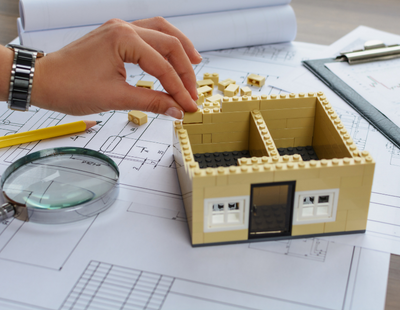The UK population is growing by more than 500,000 people each year, yet only about half the homes needed are built to match the demand. For over 8.9 million Londoners, housing remains one of the biggest problems, as referenced in the Mayor of London’s 2018 Housing Strategy. Two critical challenges remain - the speed at which new homes are built and their affordability to the end buyer. Can PropTech be the solution?
 Property Investor Today recently met with Arnie Sriskandarajah, managing director at Round Hill Ventures, a leading pan-European PropTech venture capital firm, to try and get to the bottom of this question. Incubated within multinational real estate investment firm Round Hill Capital, RHV says it is positioned to drive collaboration between key players in the real estate ecosystem, including some of the largest traditional operators, innovative startups and public bodies.
Property Investor Today recently met with Arnie Sriskandarajah, managing director at Round Hill Ventures, a leading pan-European PropTech venture capital firm, to try and get to the bottom of this question. Incubated within multinational real estate investment firm Round Hill Capital, RHV says it is positioned to drive collaboration between key players in the real estate ecosystem, including some of the largest traditional operators, innovative startups and public bodies.
Here, we ask how PropTech could help to transform the industry in the coming years - with any major changes likely to affect all parts of the market, including property investment.
What are the key problems in the industry today that you believe technology can have an impact on?
There are clear opportunities for technology to add value throughout the entire housing value chain. From the way suitable land sites are sourced, to how they are built on and sold. Take the construction industry, which has only grown by 1% globally over the last few decades.
The use of data analytics in the housebuilding process can reduce the critical operation times and costs by nearly 25%. Not only can developers build quicker, but more efficiently. For example, one of our portfolio companies, Spacemaker, uses artificial intelligence to set up massing and unit layouts to optimise construction yields.
The product can be adapted to any set of regulatory guidelines from any local municipality. The solution enables a high level of insight and a collaborative workflow among architects, engineers, real estate developers and the public sector.
Furthermore, autonomous or self-driving construction machinery is being brought to the construction industry to perform labour intensive and repetitive, time-consuming tasks such as wielding. This reduces the overall time for project completion as well as mitigating risks related to quality, safety and cost.
What is the importance of data in developing a solution?
Technology can centralise the plethora of information available into a single database. It is necessary for all stakeholders in the real estate ecosystem to understand the power of data and its role in the digital transformation of the industry.
Its usage, collection and regulation – a collaborative approach should be put in place to ensure ethical data handling and sharing.
An innovative company in the sector, LandInsight, helps both developers and estate agents to identify and analyse potential development sites. It is an example of a solution which has been adopted by the public sector and working directly with government bodies such as the Land Registry and Companies House.
A Round Hill Ventures portfolio company, SenSat, produces engineering grade real-world data in the shape of a 3D map through aerial drones. It has worked directly with the public sector on the Department of Transport’s Pathfinder program, which tested how drones can expand upon existing services and expand upon new ones, with the aim to prove safe operation in UK airspace.
Where you do see the lowest hanging fruit in PropTech? What are easy ways for innovation to take place/be implemented?
What is PropTech? Its impact goes well beyond the innovation it brings to the built world. There is an immense social aspect as a result of the digitalisation of the traditional property industry.
It is important to improve the efficiency of home building, but so is making homes accessible to the public. According to statistics, people born in 1996 are half as likely to be on the property ladder as those born 20 years earlier. The average deposit in London is close to 140% of an individual’s gross salary!
The overlap between the PropTech sector and other industries, such as finance, has given rise to new solutions which can ultimately lead to more houses sold. Proportunity, for example, provides an equity loan of up to 15% of a real estate asset’s value.
Owning property shares is also much more accessible – a platform such as Bricklane enables consumers to make tax-free investments for as little as £100.
What is the importance of the stakeholders in the industry incorporating innovation?
Technology has been adopted at a slower pace by the traditional real estate industry in comparison to other industries such as finance or travel.
The reason is not because of the lack of innovation but due to fragmentation and lack of cross-actor (sector) collaboration - there are a lot of processes yet to be put in place. A new solution can address a niche problem much slower at an individual level, than if a joint approach was taken.
Communication within the real estate industry needs to improve. Round Hill Ventures has started a series of in person-events in a way to connect Europe’s PropTech community. The pilot ‘PropTech Connect’ is set to be on December 4 and will discuss ‘scaling’, featuring well known PropTech entrepreneurs such as Tushar Agarwal (co-founder at Hubble).
The aim for this event is to be the forum where key players within the real estate ecosystem come together, gain insights and make meaningful connections.
The way forward is together; the sooner we understand it, the faster the true potential of technology in the property sector will be realised.
 Property Investor Today recently met with Arnie Sriskandarajah, managing director at Round Hill Ventures, a leading pan-European PropTech venture capital firm, to try and get to the bottom of this question. Incubated within multinational real estate investment firm Round Hill Capital, RHV says it is positioned to drive collaboration between key players in the real estate ecosystem, including some of the largest traditional operators, innovative startups and public bodies.
Property Investor Today recently met with Arnie Sriskandarajah, managing director at Round Hill Ventures, a leading pan-European PropTech venture capital firm, to try and get to the bottom of this question. Incubated within multinational real estate investment firm Round Hill Capital, RHV says it is positioned to drive collaboration between key players in the real estate ecosystem, including some of the largest traditional operators, innovative startups and public bodies.









.png)









Join the conversation
Be the first to comment (please use the comment box below)
Please login to comment